Individual Research Portfolio: People Management in the NHS
VerifiedAdded on 2020/12/09
|18
|3018
|414
Report
AI Summary
This individual research portfolio examines people management within the National Health Service (NHS). It explores theoretical models such as situational leadership and the Kurt Lewin model, applying them to the current NHS scenario. The report analyzes the roles of NHS management and the HR function in supporting management, including talent management, performance appraisal, and succession planning. It also discusses internal and external influences on leadership, training and development, and talent management, such as resources and processes. Furthermore, the report provides recommendations for addressing challenges related to leadership, training, and employee retention, emphasizing the adoption of democratic and participative leadership styles. The report includes a detailed analysis of the 5 B's model of talent management and the systems model of training and development, offering insights into how the NHS can attract, develop, and retain skilled professionals. Finally, it emphasizes the importance of aligning leadership approaches with the evolving needs of healthcare, including the advancements in treatment processes for the growing and aging population.

INDIVIDUAL RESEARCH PORTFOLIO
Paraphrase This Document
Need a fresh take? Get an instant paraphrase of this document with our AI Paraphraser
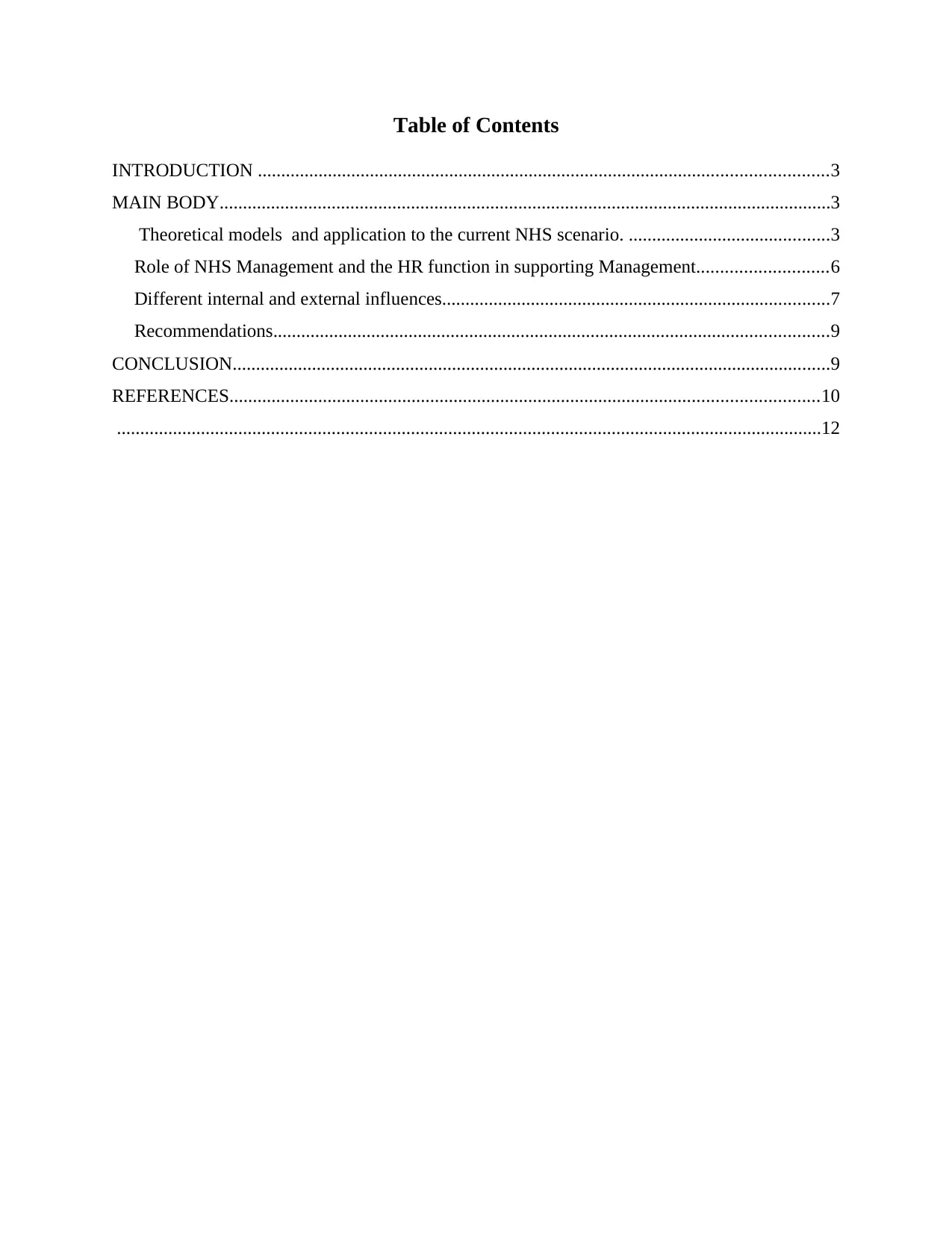
Table of Contents
INTRODUCTION ..........................................................................................................................3
MAIN BODY...................................................................................................................................3
Theoretical models and application to the current NHS scenario. ...........................................3
Role of NHS Management and the HR function in supporting Management............................6
Different internal and external influences...................................................................................7
Recommendations.......................................................................................................................9
CONCLUSION................................................................................................................................9
REFERENCES..............................................................................................................................10
.......................................................................................................................................................12
INTRODUCTION ..........................................................................................................................3
MAIN BODY...................................................................................................................................3
Theoretical models and application to the current NHS scenario. ...........................................3
Role of NHS Management and the HR function in supporting Management............................6
Different internal and external influences...................................................................................7
Recommendations.......................................................................................................................9
CONCLUSION................................................................................................................................9
REFERENCES..............................................................................................................................10
.......................................................................................................................................................12
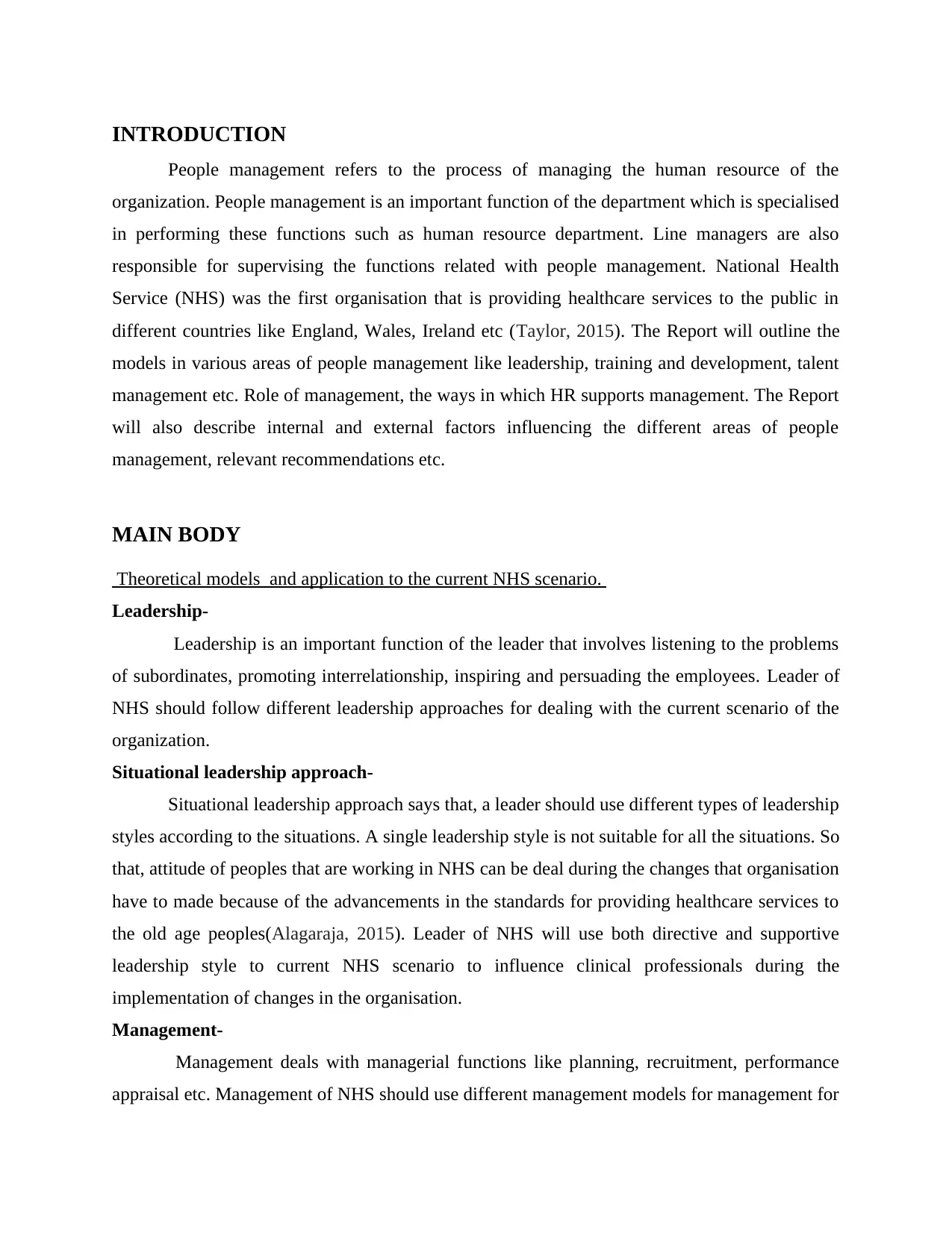
INTRODUCTION
People management refers to the process of managing the human resource of the
organization. People management is an important function of the department which is specialised
in performing these functions such as human resource department. Line managers are also
responsible for supervising the functions related with people management. National Health
Service (NHS) was the first organisation that is providing healthcare services to the public in
different countries like England, Wales, Ireland etc (Taylor, 2015). The Report will outline the
models in various areas of people management like leadership, training and development, talent
management etc. Role of management, the ways in which HR supports management. The Report
will also describe internal and external factors influencing the different areas of people
management, relevant recommendations etc.
MAIN BODY
Theoretical models and application to the current NHS scenario.
Leadership-
Leadership is an important function of the leader that involves listening to the problems
of subordinates, promoting interrelationship, inspiring and persuading the employees. Leader of
NHS should follow different leadership approaches for dealing with the current scenario of the
organization.
Situational leadership approach-
Situational leadership approach says that, a leader should use different types of leadership
styles according to the situations. A single leadership style is not suitable for all the situations. So
that, attitude of peoples that are working in NHS can be deal during the changes that organisation
have to made because of the advancements in the standards for providing healthcare services to
the old age peoples(Alagaraja, 2015). Leader of NHS will use both directive and supportive
leadership style to current NHS scenario to influence clinical professionals during the
implementation of changes in the organisation.
Management-
Management deals with managerial functions like planning, recruitment, performance
appraisal etc. Management of NHS should use different management models for management for
People management refers to the process of managing the human resource of the
organization. People management is an important function of the department which is specialised
in performing these functions such as human resource department. Line managers are also
responsible for supervising the functions related with people management. National Health
Service (NHS) was the first organisation that is providing healthcare services to the public in
different countries like England, Wales, Ireland etc (Taylor, 2015). The Report will outline the
models in various areas of people management like leadership, training and development, talent
management etc. Role of management, the ways in which HR supports management. The Report
will also describe internal and external factors influencing the different areas of people
management, relevant recommendations etc.
MAIN BODY
Theoretical models and application to the current NHS scenario.
Leadership-
Leadership is an important function of the leader that involves listening to the problems
of subordinates, promoting interrelationship, inspiring and persuading the employees. Leader of
NHS should follow different leadership approaches for dealing with the current scenario of the
organization.
Situational leadership approach-
Situational leadership approach says that, a leader should use different types of leadership
styles according to the situations. A single leadership style is not suitable for all the situations. So
that, attitude of peoples that are working in NHS can be deal during the changes that organisation
have to made because of the advancements in the standards for providing healthcare services to
the old age peoples(Alagaraja, 2015). Leader of NHS will use both directive and supportive
leadership style to current NHS scenario to influence clinical professionals during the
implementation of changes in the organisation.
Management-
Management deals with managerial functions like planning, recruitment, performance
appraisal etc. Management of NHS should use different management models for management for
⊘ This is a preview!⊘
Do you want full access?
Subscribe today to unlock all pages.

Trusted by 1+ million students worldwide
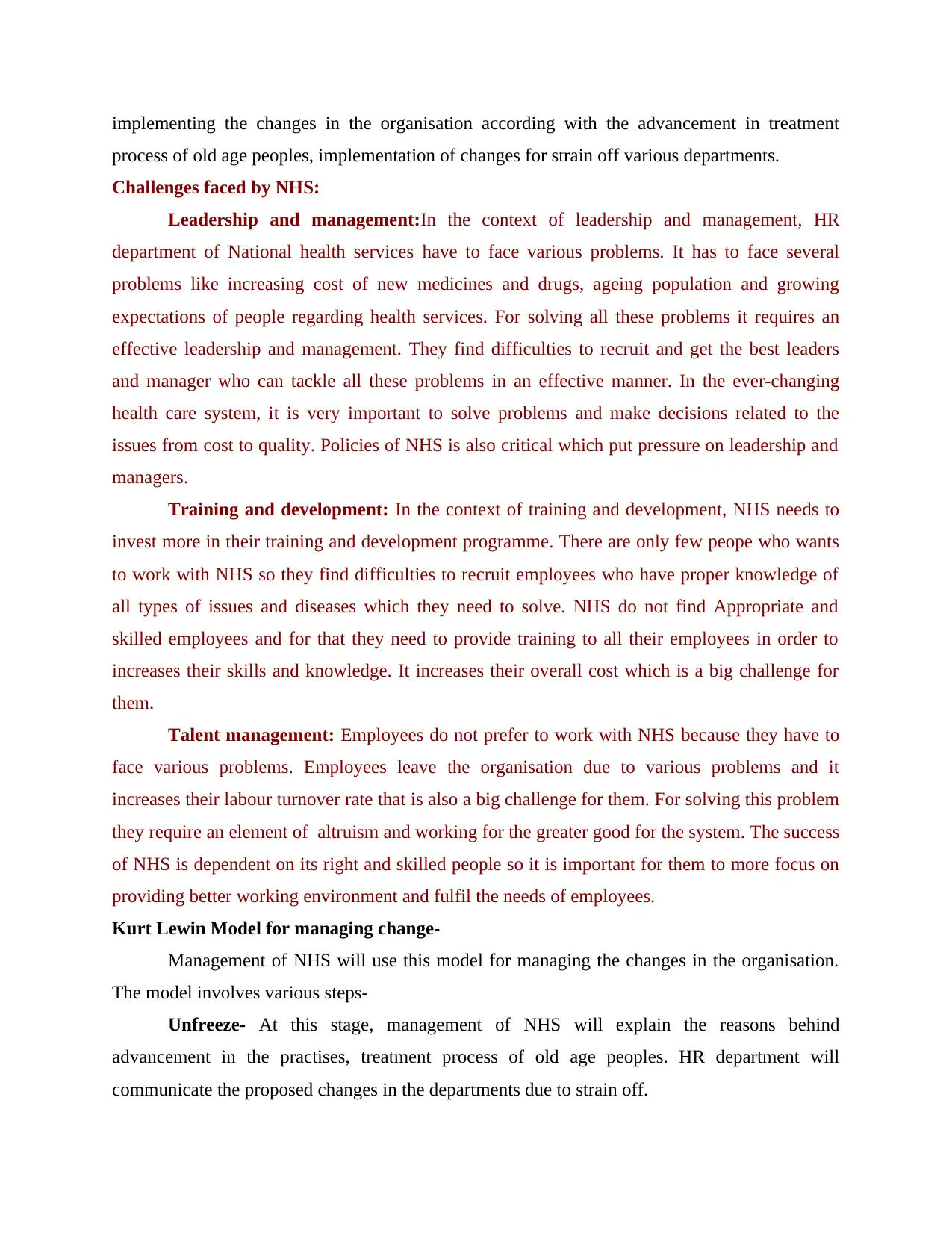
implementing the changes in the organisation according with the advancement in treatment
process of old age peoples, implementation of changes for strain off various departments.
Challenges faced by NHS:
Leadership and management:In the context of leadership and management, HR
department of National health services have to face various problems. It has to face several
problems like increasing cost of new medicines and drugs, ageing population and growing
expectations of people regarding health services. For solving all these problems it requires an
effective leadership and management. They find difficulties to recruit and get the best leaders
and manager who can tackle all these problems in an effective manner. In the ever-changing
health care system, it is very important to solve problems and make decisions related to the
issues from cost to quality. Policies of NHS is also critical which put pressure on leadership and
managers.
Training and development: In the context of training and development, NHS needs to
invest more in their training and development programme. There are only few peope who wants
to work with NHS so they find difficulties to recruit employees who have proper knowledge of
all types of issues and diseases which they need to solve. NHS do not find Appropriate and
skilled employees and for that they need to provide training to all their employees in order to
increases their skills and knowledge. It increases their overall cost which is a big challenge for
them.
Talent management: Employees do not prefer to work with NHS because they have to
face various problems. Employees leave the organisation due to various problems and it
increases their labour turnover rate that is also a big challenge for them. For solving this problem
they require an element of altruism and working for the greater good for the system. The success
of NHS is dependent on its right and skilled people so it is important for them to more focus on
providing better working environment and fulfil the needs of employees.
Kurt Lewin Model for managing change-
Management of NHS will use this model for managing the changes in the organisation.
The model involves various steps-
Unfreeze- At this stage, management of NHS will explain the reasons behind
advancement in the practises, treatment process of old age peoples. HR department will
communicate the proposed changes in the departments due to strain off.
process of old age peoples, implementation of changes for strain off various departments.
Challenges faced by NHS:
Leadership and management:In the context of leadership and management, HR
department of National health services have to face various problems. It has to face several
problems like increasing cost of new medicines and drugs, ageing population and growing
expectations of people regarding health services. For solving all these problems it requires an
effective leadership and management. They find difficulties to recruit and get the best leaders
and manager who can tackle all these problems in an effective manner. In the ever-changing
health care system, it is very important to solve problems and make decisions related to the
issues from cost to quality. Policies of NHS is also critical which put pressure on leadership and
managers.
Training and development: In the context of training and development, NHS needs to
invest more in their training and development programme. There are only few peope who wants
to work with NHS so they find difficulties to recruit employees who have proper knowledge of
all types of issues and diseases which they need to solve. NHS do not find Appropriate and
skilled employees and for that they need to provide training to all their employees in order to
increases their skills and knowledge. It increases their overall cost which is a big challenge for
them.
Talent management: Employees do not prefer to work with NHS because they have to
face various problems. Employees leave the organisation due to various problems and it
increases their labour turnover rate that is also a big challenge for them. For solving this problem
they require an element of altruism and working for the greater good for the system. The success
of NHS is dependent on its right and skilled people so it is important for them to more focus on
providing better working environment and fulfil the needs of employees.
Kurt Lewin Model for managing change-
Management of NHS will use this model for managing the changes in the organisation.
The model involves various steps-
Unfreeze- At this stage, management of NHS will explain the reasons behind
advancement in the practises, treatment process of old age peoples. HR department will
communicate the proposed changes in the departments due to strain off.
Paraphrase This Document
Need a fresh take? Get an instant paraphrase of this document with our AI Paraphraser
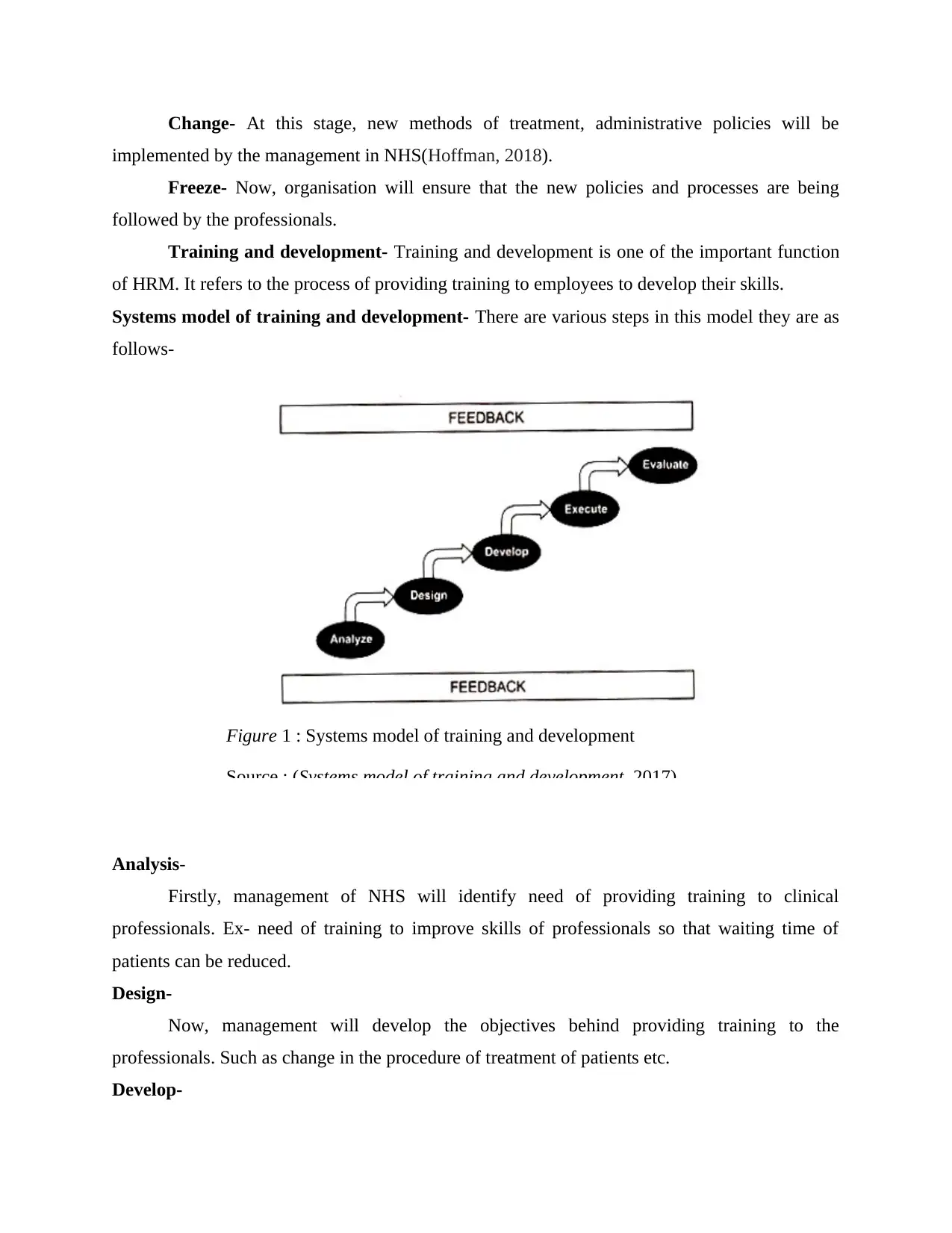
Change- At this stage, new methods of treatment, administrative policies will be
implemented by the management in NHS(Hoffman, 2018).
Freeze- Now, organisation will ensure that the new policies and processes are being
followed by the professionals.
Training and development- Training and development is one of the important function
of HRM. It refers to the process of providing training to employees to develop their skills.
Systems model of training and development- There are various steps in this model they are as
follows-
Analysis-
Firstly, management of NHS will identify need of providing training to clinical
professionals. Ex- need of training to improve skills of professionals so that waiting time of
patients can be reduced.
Design-
Now, management will develop the objectives behind providing training to the
professionals. Such as change in the procedure of treatment of patients etc.
Develop-
Figure 1 : Systems model of training and development
Source : (Systems model of training and development, 2017)
implemented by the management in NHS(Hoffman, 2018).
Freeze- Now, organisation will ensure that the new policies and processes are being
followed by the professionals.
Training and development- Training and development is one of the important function
of HRM. It refers to the process of providing training to employees to develop their skills.
Systems model of training and development- There are various steps in this model they are as
follows-
Analysis-
Firstly, management of NHS will identify need of providing training to clinical
professionals. Ex- need of training to improve skills of professionals so that waiting time of
patients can be reduced.
Design-
Now, management will develop the objectives behind providing training to the
professionals. Such as change in the procedure of treatment of patients etc.
Develop-
Figure 1 : Systems model of training and development
Source : (Systems model of training and development, 2017)
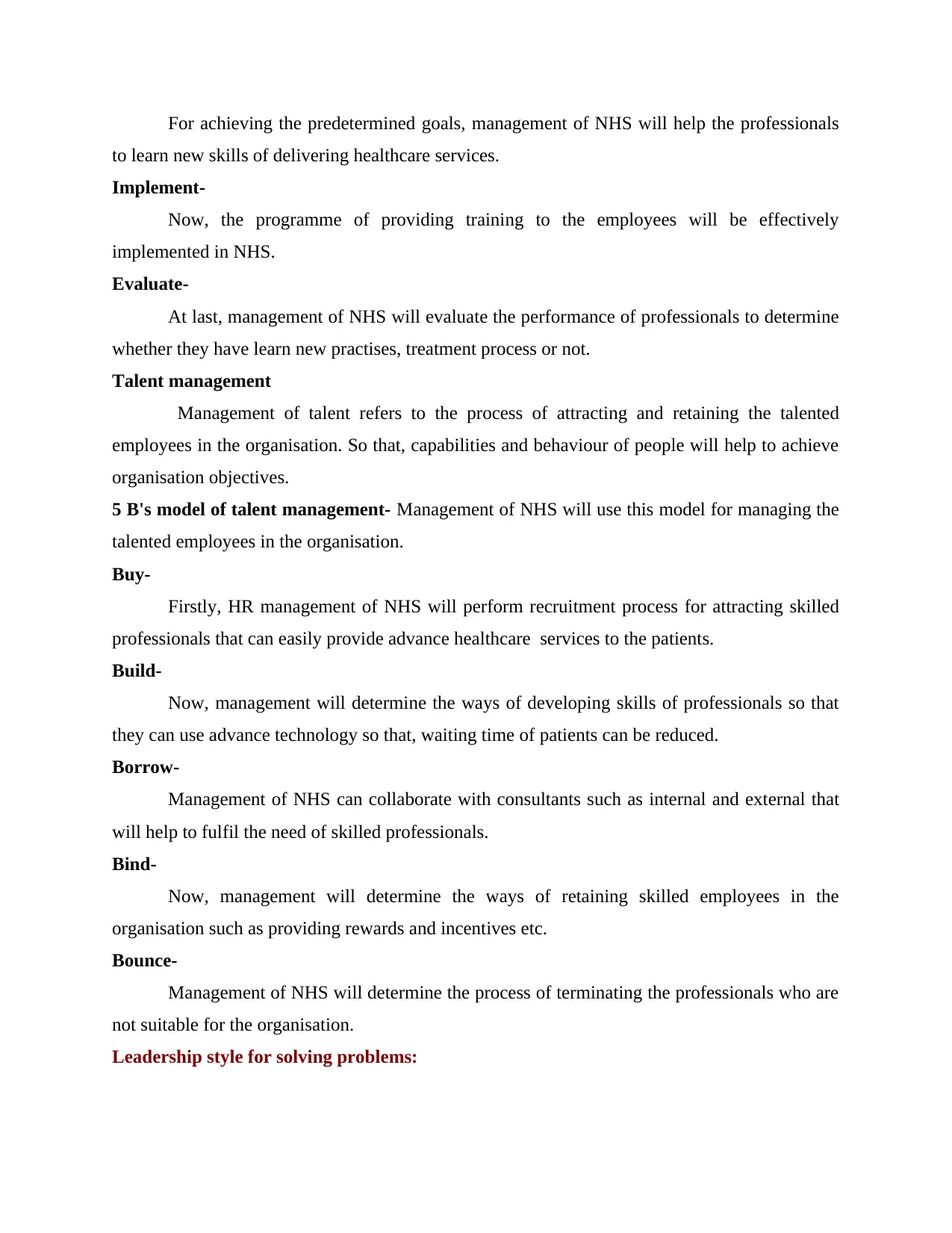
For achieving the predetermined goals, management of NHS will help the professionals
to learn new skills of delivering healthcare services.
Implement-
Now, the programme of providing training to the employees will be effectively
implemented in NHS.
Evaluate-
At last, management of NHS will evaluate the performance of professionals to determine
whether they have learn new practises, treatment process or not.
Talent management
Management of talent refers to the process of attracting and retaining the talented
employees in the organisation. So that, capabilities and behaviour of people will help to achieve
organisation objectives.
5 B's model of talent management- Management of NHS will use this model for managing the
talented employees in the organisation.
Buy-
Firstly, HR management of NHS will perform recruitment process for attracting skilled
professionals that can easily provide advance healthcare services to the patients.
Build-
Now, management will determine the ways of developing skills of professionals so that
they can use advance technology so that, waiting time of patients can be reduced.
Borrow-
Management of NHS can collaborate with consultants such as internal and external that
will help to fulfil the need of skilled professionals.
Bind-
Now, management will determine the ways of retaining skilled employees in the
organisation such as providing rewards and incentives etc.
Bounce-
Management of NHS will determine the process of terminating the professionals who are
not suitable for the organisation.
Leadership style for solving problems:
to learn new skills of delivering healthcare services.
Implement-
Now, the programme of providing training to the employees will be effectively
implemented in NHS.
Evaluate-
At last, management of NHS will evaluate the performance of professionals to determine
whether they have learn new practises, treatment process or not.
Talent management
Management of talent refers to the process of attracting and retaining the talented
employees in the organisation. So that, capabilities and behaviour of people will help to achieve
organisation objectives.
5 B's model of talent management- Management of NHS will use this model for managing the
talented employees in the organisation.
Buy-
Firstly, HR management of NHS will perform recruitment process for attracting skilled
professionals that can easily provide advance healthcare services to the patients.
Build-
Now, management will determine the ways of developing skills of professionals so that
they can use advance technology so that, waiting time of patients can be reduced.
Borrow-
Management of NHS can collaborate with consultants such as internal and external that
will help to fulfil the need of skilled professionals.
Bind-
Now, management will determine the ways of retaining skilled employees in the
organisation such as providing rewards and incentives etc.
Bounce-
Management of NHS will determine the process of terminating the professionals who are
not suitable for the organisation.
Leadership style for solving problems:
⊘ This is a preview!⊘
Do you want full access?
Subscribe today to unlock all pages.

Trusted by 1+ million students worldwide
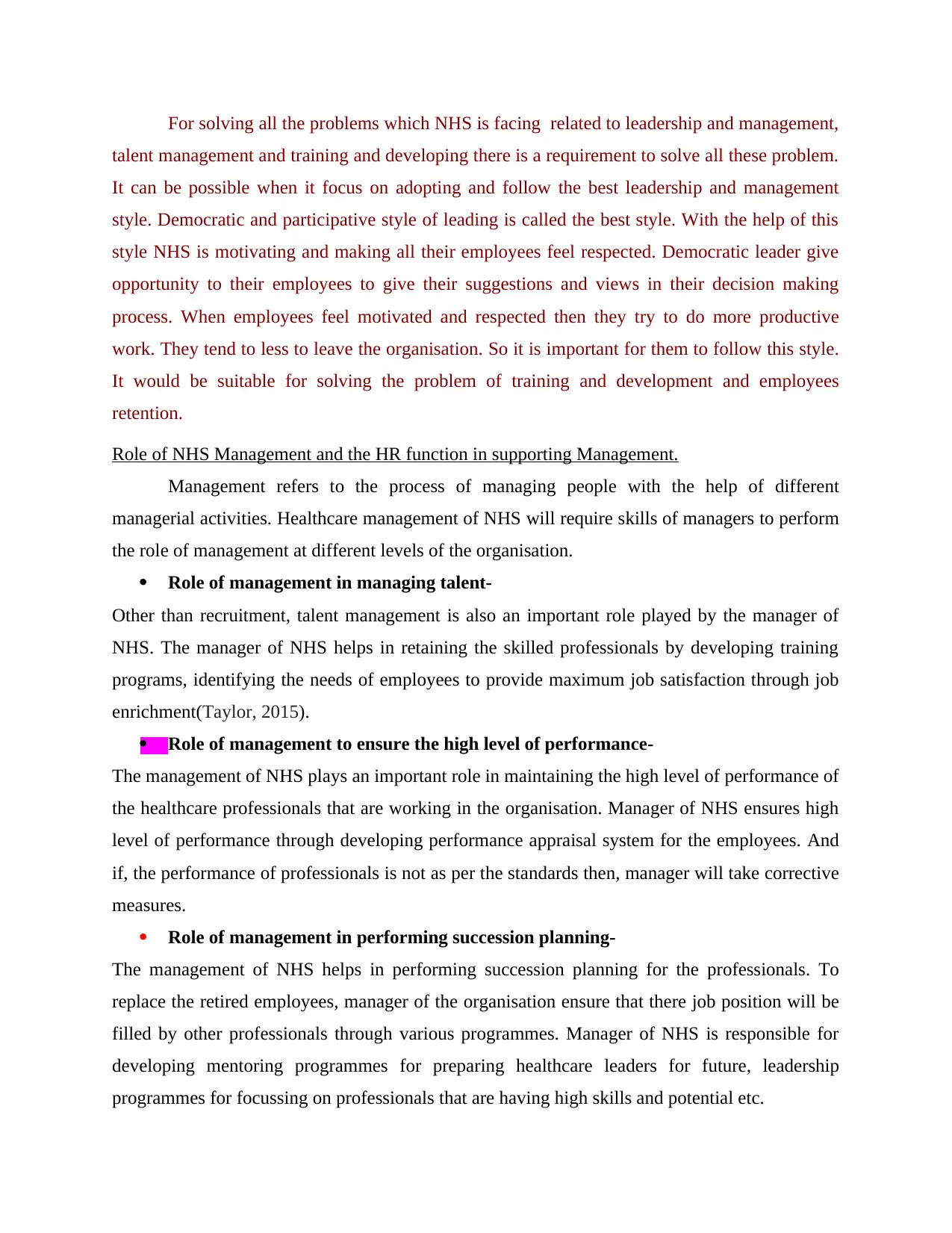
For solving all the problems which NHS is facing related to leadership and management,
talent management and training and developing there is a requirement to solve all these problem.
It can be possible when it focus on adopting and follow the best leadership and management
style. Democratic and participative style of leading is called the best style. With the help of this
style NHS is motivating and making all their employees feel respected. Democratic leader give
opportunity to their employees to give their suggestions and views in their decision making
process. When employees feel motivated and respected then they try to do more productive
work. They tend to less to leave the organisation. So it is important for them to follow this style.
It would be suitable for solving the problem of training and development and employees
retention.
Role of NHS Management and the HR function in supporting Management.
Management refers to the process of managing people with the help of different
managerial activities. Healthcare management of NHS will require skills of managers to perform
the role of management at different levels of the organisation.
Role of management in managing talent-
Other than recruitment, talent management is also an important role played by the manager of
NHS. The manager of NHS helps in retaining the skilled professionals by developing training
programs, identifying the needs of employees to provide maximum job satisfaction through job
enrichment(Taylor, 2015).
Role of management to ensure the high level of performance-
The management of NHS plays an important role in maintaining the high level of performance of
the healthcare professionals that are working in the organisation. Manager of NHS ensures high
level of performance through developing performance appraisal system for the employees. And
if, the performance of professionals is not as per the standards then, manager will take corrective
measures.
Role of management in performing succession planning-
The management of NHS helps in performing succession planning for the professionals. To
replace the retired employees, manager of the organisation ensure that there job position will be
filled by other professionals through various programmes. Manager of NHS is responsible for
developing mentoring programmes for preparing healthcare leaders for future, leadership
programmes for focussing on professionals that are having high skills and potential etc.
talent management and training and developing there is a requirement to solve all these problem.
It can be possible when it focus on adopting and follow the best leadership and management
style. Democratic and participative style of leading is called the best style. With the help of this
style NHS is motivating and making all their employees feel respected. Democratic leader give
opportunity to their employees to give their suggestions and views in their decision making
process. When employees feel motivated and respected then they try to do more productive
work. They tend to less to leave the organisation. So it is important for them to follow this style.
It would be suitable for solving the problem of training and development and employees
retention.
Role of NHS Management and the HR function in supporting Management.
Management refers to the process of managing people with the help of different
managerial activities. Healthcare management of NHS will require skills of managers to perform
the role of management at different levels of the organisation.
Role of management in managing talent-
Other than recruitment, talent management is also an important role played by the manager of
NHS. The manager of NHS helps in retaining the skilled professionals by developing training
programs, identifying the needs of employees to provide maximum job satisfaction through job
enrichment(Taylor, 2015).
Role of management to ensure the high level of performance-
The management of NHS plays an important role in maintaining the high level of performance of
the healthcare professionals that are working in the organisation. Manager of NHS ensures high
level of performance through developing performance appraisal system for the employees. And
if, the performance of professionals is not as per the standards then, manager will take corrective
measures.
Role of management in performing succession planning-
The management of NHS helps in performing succession planning for the professionals. To
replace the retired employees, manager of the organisation ensure that there job position will be
filled by other professionals through various programmes. Manager of NHS is responsible for
developing mentoring programmes for preparing healthcare leaders for future, leadership
programmes for focussing on professionals that are having high skills and potential etc.
Paraphrase This Document
Need a fresh take? Get an instant paraphrase of this document with our AI Paraphraser
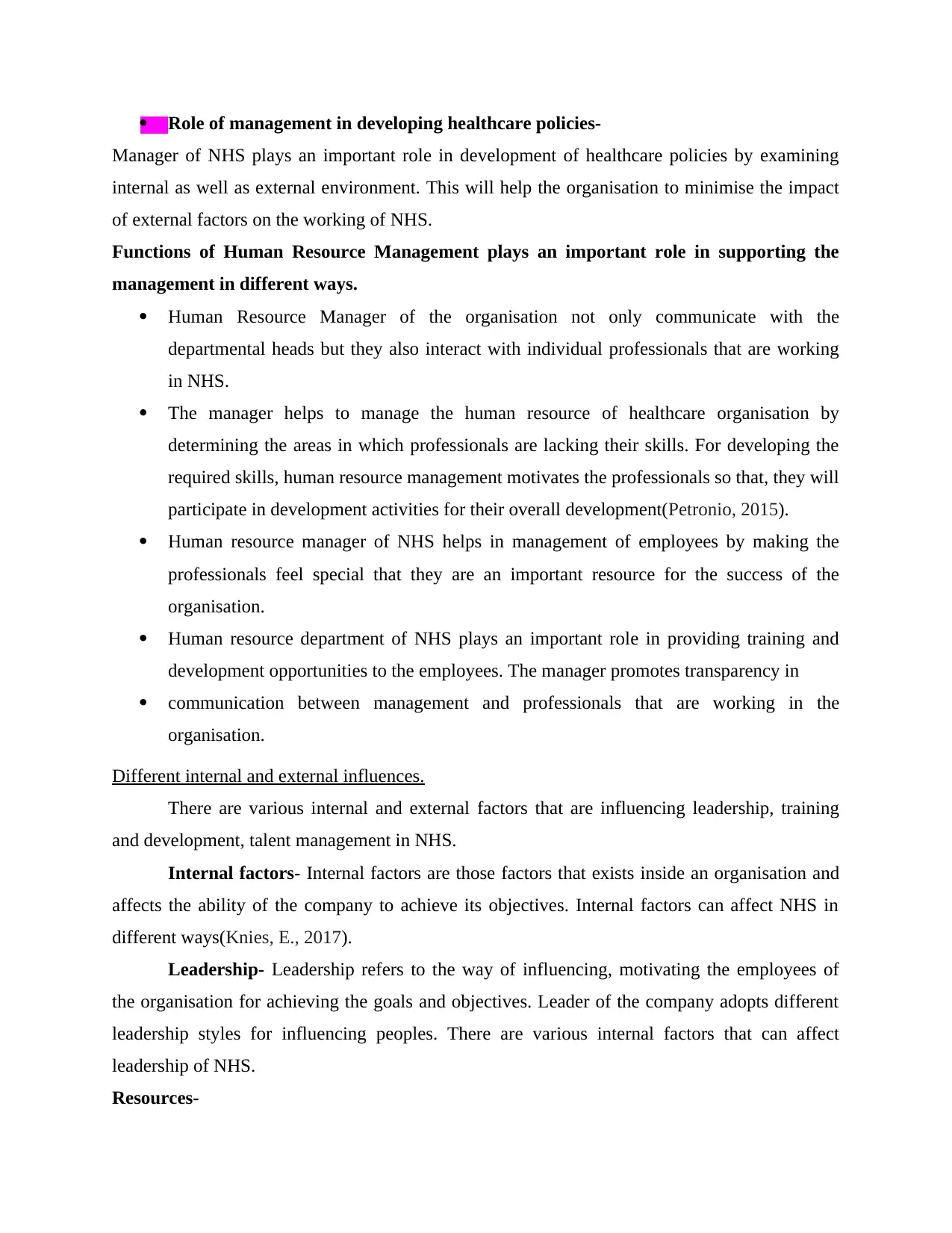
Role of management in developing healthcare policies-
Manager of NHS plays an important role in development of healthcare policies by examining
internal as well as external environment. This will help the organisation to minimise the impact
of external factors on the working of NHS.
Functions of Human Resource Management plays an important role in supporting the
management in different ways.
Human Resource Manager of the organisation not only communicate with the
departmental heads but they also interact with individual professionals that are working
in NHS.
The manager helps to manage the human resource of healthcare organisation by
determining the areas in which professionals are lacking their skills. For developing the
required skills, human resource management motivates the professionals so that, they will
participate in development activities for their overall development(Petronio, 2015).
Human resource manager of NHS helps in management of employees by making the
professionals feel special that they are an important resource for the success of the
organisation.
Human resource department of NHS plays an important role in providing training and
development opportunities to the employees. The manager promotes transparency in
communication between management and professionals that are working in the
organisation.
Different internal and external influences.
There are various internal and external factors that are influencing leadership, training
and development, talent management in NHS.
Internal factors- Internal factors are those factors that exists inside an organisation and
affects the ability of the company to achieve its objectives. Internal factors can affect NHS in
different ways(Knies, E., 2017).
Leadership- Leadership refers to the way of influencing, motivating the employees of
the organisation for achieving the goals and objectives. Leader of the company adopts different
leadership styles for influencing peoples. There are various internal factors that can affect
leadership of NHS.
Resources-
Manager of NHS plays an important role in development of healthcare policies by examining
internal as well as external environment. This will help the organisation to minimise the impact
of external factors on the working of NHS.
Functions of Human Resource Management plays an important role in supporting the
management in different ways.
Human Resource Manager of the organisation not only communicate with the
departmental heads but they also interact with individual professionals that are working
in NHS.
The manager helps to manage the human resource of healthcare organisation by
determining the areas in which professionals are lacking their skills. For developing the
required skills, human resource management motivates the professionals so that, they will
participate in development activities for their overall development(Petronio, 2015).
Human resource manager of NHS helps in management of employees by making the
professionals feel special that they are an important resource for the success of the
organisation.
Human resource department of NHS plays an important role in providing training and
development opportunities to the employees. The manager promotes transparency in
communication between management and professionals that are working in the
organisation.
Different internal and external influences.
There are various internal and external factors that are influencing leadership, training
and development, talent management in NHS.
Internal factors- Internal factors are those factors that exists inside an organisation and
affects the ability of the company to achieve its objectives. Internal factors can affect NHS in
different ways(Knies, E., 2017).
Leadership- Leadership refers to the way of influencing, motivating the employees of
the organisation for achieving the goals and objectives. Leader of the company adopts different
leadership styles for influencing peoples. There are various internal factors that can affect
leadership of NHS.
Resources-
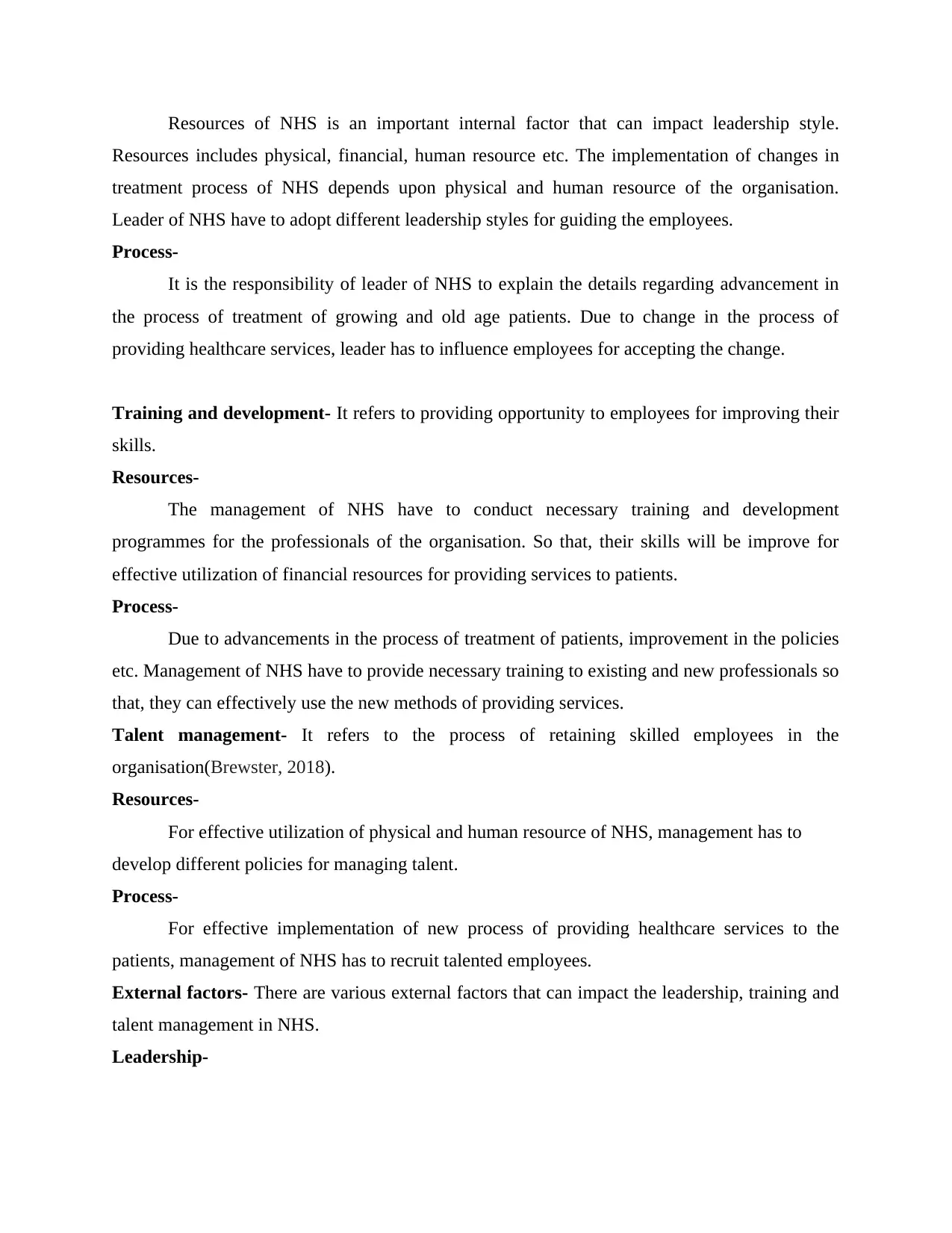
Resources of NHS is an important internal factor that can impact leadership style.
Resources includes physical, financial, human resource etc. The implementation of changes in
treatment process of NHS depends upon physical and human resource of the organisation.
Leader of NHS have to adopt different leadership styles for guiding the employees.
Process-
It is the responsibility of leader of NHS to explain the details regarding advancement in
the process of treatment of growing and old age patients. Due to change in the process of
providing healthcare services, leader has to influence employees for accepting the change.
Training and development- It refers to providing opportunity to employees for improving their
skills.
Resources-
The management of NHS have to conduct necessary training and development
programmes for the professionals of the organisation. So that, their skills will be improve for
effective utilization of financial resources for providing services to patients.
Process-
Due to advancements in the process of treatment of patients, improvement in the policies
etc. Management of NHS have to provide necessary training to existing and new professionals so
that, they can effectively use the new methods of providing services.
Talent management- It refers to the process of retaining skilled employees in the
organisation(Brewster, 2018).
Resources-
For effective utilization of physical and human resource of NHS, management has to
develop different policies for managing talent.
Process-
For effective implementation of new process of providing healthcare services to the
patients, management of NHS has to recruit talented employees.
External factors- There are various external factors that can impact the leadership, training and
talent management in NHS.
Leadership-
Resources includes physical, financial, human resource etc. The implementation of changes in
treatment process of NHS depends upon physical and human resource of the organisation.
Leader of NHS have to adopt different leadership styles for guiding the employees.
Process-
It is the responsibility of leader of NHS to explain the details regarding advancement in
the process of treatment of growing and old age patients. Due to change in the process of
providing healthcare services, leader has to influence employees for accepting the change.
Training and development- It refers to providing opportunity to employees for improving their
skills.
Resources-
The management of NHS have to conduct necessary training and development
programmes for the professionals of the organisation. So that, their skills will be improve for
effective utilization of financial resources for providing services to patients.
Process-
Due to advancements in the process of treatment of patients, improvement in the policies
etc. Management of NHS have to provide necessary training to existing and new professionals so
that, they can effectively use the new methods of providing services.
Talent management- It refers to the process of retaining skilled employees in the
organisation(Brewster, 2018).
Resources-
For effective utilization of physical and human resource of NHS, management has to
develop different policies for managing talent.
Process-
For effective implementation of new process of providing healthcare services to the
patients, management of NHS has to recruit talented employees.
External factors- There are various external factors that can impact the leadership, training and
talent management in NHS.
Leadership-
⊘ This is a preview!⊘
Do you want full access?
Subscribe today to unlock all pages.

Trusted by 1+ million students worldwide
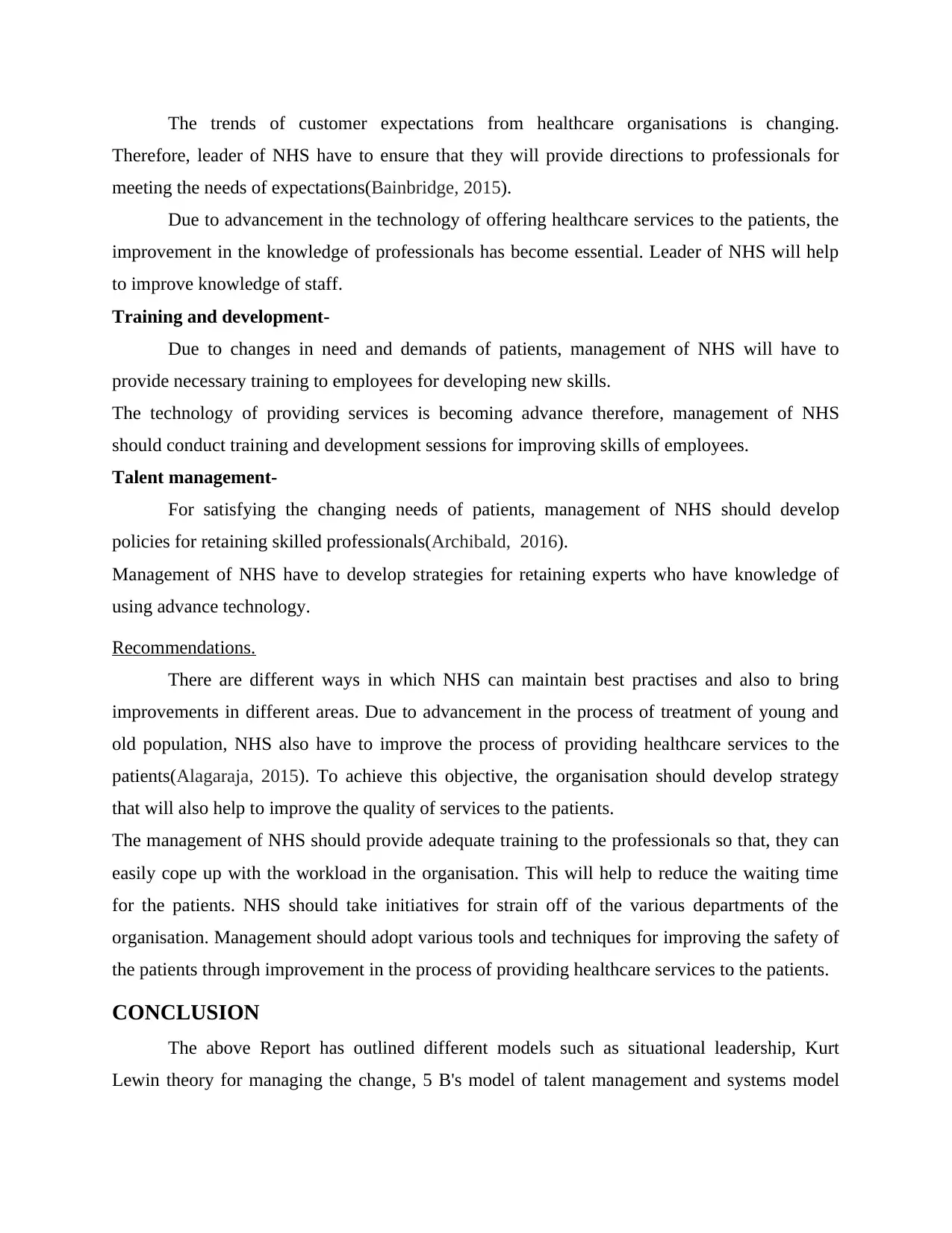
The trends of customer expectations from healthcare organisations is changing.
Therefore, leader of NHS have to ensure that they will provide directions to professionals for
meeting the needs of expectations(Bainbridge, 2015).
Due to advancement in the technology of offering healthcare services to the patients, the
improvement in the knowledge of professionals has become essential. Leader of NHS will help
to improve knowledge of staff.
Training and development-
Due to changes in need and demands of patients, management of NHS will have to
provide necessary training to employees for developing new skills.
The technology of providing services is becoming advance therefore, management of NHS
should conduct training and development sessions for improving skills of employees.
Talent management-
For satisfying the changing needs of patients, management of NHS should develop
policies for retaining skilled professionals(Archibald, 2016).
Management of NHS have to develop strategies for retaining experts who have knowledge of
using advance technology.
Recommendations.
There are different ways in which NHS can maintain best practises and also to bring
improvements in different areas. Due to advancement in the process of treatment of young and
old population, NHS also have to improve the process of providing healthcare services to the
patients(Alagaraja, 2015). To achieve this objective, the organisation should develop strategy
that will also help to improve the quality of services to the patients.
The management of NHS should provide adequate training to the professionals so that, they can
easily cope up with the workload in the organisation. This will help to reduce the waiting time
for the patients. NHS should take initiatives for strain off of the various departments of the
organisation. Management should adopt various tools and techniques for improving the safety of
the patients through improvement in the process of providing healthcare services to the patients.
CONCLUSION
The above Report has outlined different models such as situational leadership, Kurt
Lewin theory for managing the change, 5 B's model of talent management and systems model
Therefore, leader of NHS have to ensure that they will provide directions to professionals for
meeting the needs of expectations(Bainbridge, 2015).
Due to advancement in the technology of offering healthcare services to the patients, the
improvement in the knowledge of professionals has become essential. Leader of NHS will help
to improve knowledge of staff.
Training and development-
Due to changes in need and demands of patients, management of NHS will have to
provide necessary training to employees for developing new skills.
The technology of providing services is becoming advance therefore, management of NHS
should conduct training and development sessions for improving skills of employees.
Talent management-
For satisfying the changing needs of patients, management of NHS should develop
policies for retaining skilled professionals(Archibald, 2016).
Management of NHS have to develop strategies for retaining experts who have knowledge of
using advance technology.
Recommendations.
There are different ways in which NHS can maintain best practises and also to bring
improvements in different areas. Due to advancement in the process of treatment of young and
old population, NHS also have to improve the process of providing healthcare services to the
patients(Alagaraja, 2015). To achieve this objective, the organisation should develop strategy
that will also help to improve the quality of services to the patients.
The management of NHS should provide adequate training to the professionals so that, they can
easily cope up with the workload in the organisation. This will help to reduce the waiting time
for the patients. NHS should take initiatives for strain off of the various departments of the
organisation. Management should adopt various tools and techniques for improving the safety of
the patients through improvement in the process of providing healthcare services to the patients.
CONCLUSION
The above Report has outlined different models such as situational leadership, Kurt
Lewin theory for managing the change, 5 B's model of talent management and systems model
Paraphrase This Document
Need a fresh take? Get an instant paraphrase of this document with our AI Paraphraser
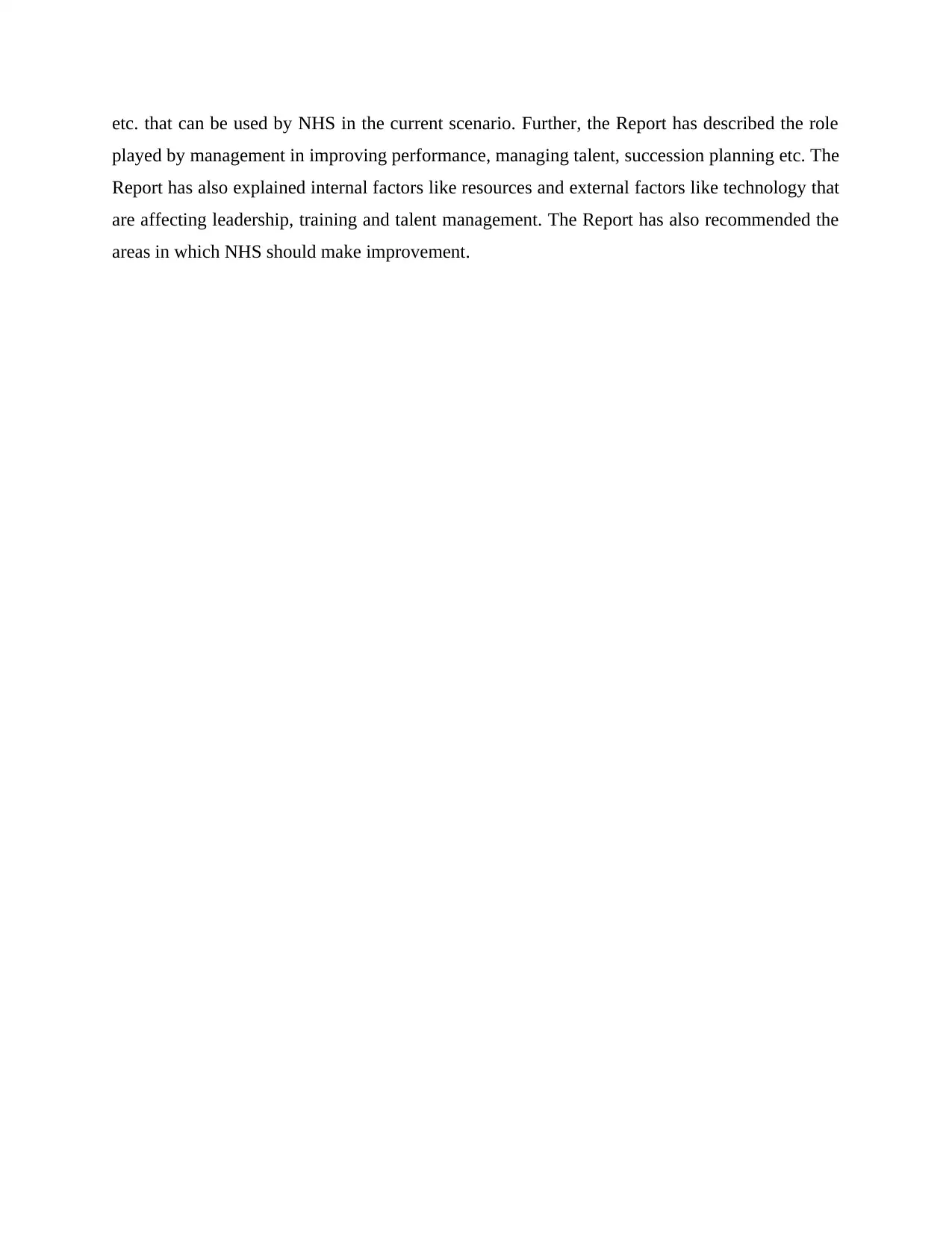
etc. that can be used by NHS in the current scenario. Further, the Report has described the role
played by management in improving performance, managing talent, succession planning etc. The
Report has also explained internal factors like resources and external factors like technology that
are affecting leadership, training and talent management. The Report has also recommended the
areas in which NHS should make improvement.
played by management in improving performance, managing talent, succession planning etc. The
Report has also explained internal factors like resources and external factors like technology that
are affecting leadership, training and talent management. The Report has also recommended the
areas in which NHS should make improvement.
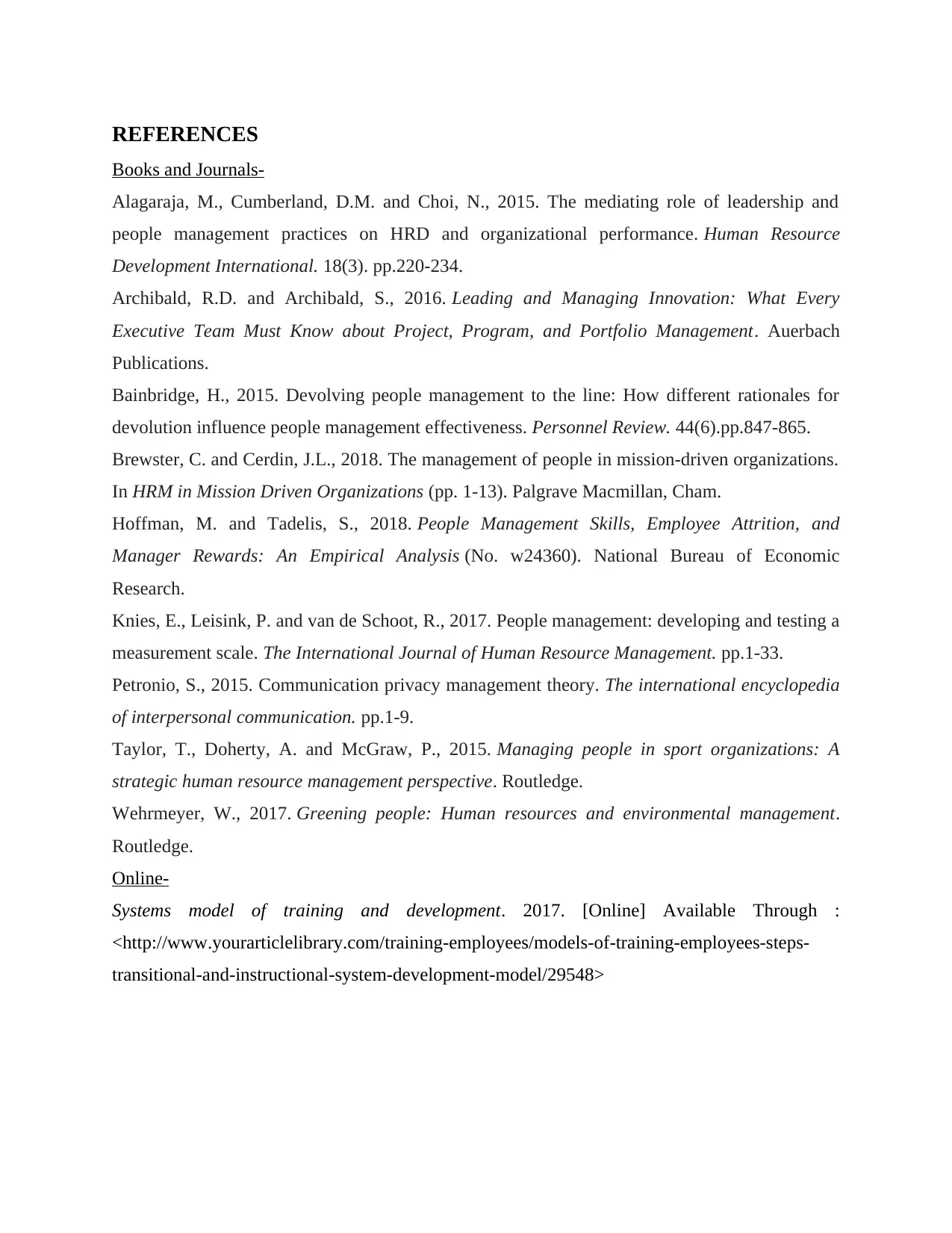
REFERENCES
Books and Journals-
Alagaraja, M., Cumberland, D.M. and Choi, N., 2015. The mediating role of leadership and
people management practices on HRD and organizational performance. Human Resource
Development International. 18(3). pp.220-234.
Archibald, R.D. and Archibald, S., 2016. Leading and Managing Innovation: What Every
Executive Team Must Know about Project, Program, and Portfolio Management. Auerbach
Publications.
Bainbridge, H., 2015. Devolving people management to the line: How different rationales for
devolution influence people management effectiveness. Personnel Review. 44(6).pp.847-865.
Brewster, C. and Cerdin, J.L., 2018. The management of people in mission-driven organizations.
In HRM in Mission Driven Organizations (pp. 1-13). Palgrave Macmillan, Cham.
Hoffman, M. and Tadelis, S., 2018. People Management Skills, Employee Attrition, and
Manager Rewards: An Empirical Analysis (No. w24360). National Bureau of Economic
Research.
Knies, E., Leisink, P. and van de Schoot, R., 2017. People management: developing and testing a
measurement scale. The International Journal of Human Resource Management. pp.1-33.
Petronio, S., 2015. Communication privacy management theory. The international encyclopedia
of interpersonal communication. pp.1-9.
Taylor, T., Doherty, A. and McGraw, P., 2015. Managing people in sport organizations: A
strategic human resource management perspective. Routledge.
Wehrmeyer, W., 2017. Greening people: Human resources and environmental management.
Routledge.
Online-
Systems model of training and development. 2017. [Online] Available Through :
<http://www.yourarticlelibrary.com/training-employees/models-of-training-employees-steps-
transitional-and-instructional-system-development-model/29548>
Books and Journals-
Alagaraja, M., Cumberland, D.M. and Choi, N., 2015. The mediating role of leadership and
people management practices on HRD and organizational performance. Human Resource
Development International. 18(3). pp.220-234.
Archibald, R.D. and Archibald, S., 2016. Leading and Managing Innovation: What Every
Executive Team Must Know about Project, Program, and Portfolio Management. Auerbach
Publications.
Bainbridge, H., 2015. Devolving people management to the line: How different rationales for
devolution influence people management effectiveness. Personnel Review. 44(6).pp.847-865.
Brewster, C. and Cerdin, J.L., 2018. The management of people in mission-driven organizations.
In HRM in Mission Driven Organizations (pp. 1-13). Palgrave Macmillan, Cham.
Hoffman, M. and Tadelis, S., 2018. People Management Skills, Employee Attrition, and
Manager Rewards: An Empirical Analysis (No. w24360). National Bureau of Economic
Research.
Knies, E., Leisink, P. and van de Schoot, R., 2017. People management: developing and testing a
measurement scale. The International Journal of Human Resource Management. pp.1-33.
Petronio, S., 2015. Communication privacy management theory. The international encyclopedia
of interpersonal communication. pp.1-9.
Taylor, T., Doherty, A. and McGraw, P., 2015. Managing people in sport organizations: A
strategic human resource management perspective. Routledge.
Wehrmeyer, W., 2017. Greening people: Human resources and environmental management.
Routledge.
Online-
Systems model of training and development. 2017. [Online] Available Through :
<http://www.yourarticlelibrary.com/training-employees/models-of-training-employees-steps-
transitional-and-instructional-system-development-model/29548>
⊘ This is a preview!⊘
Do you want full access?
Subscribe today to unlock all pages.

Trusted by 1+ million students worldwide
1 out of 18
Related Documents
Your All-in-One AI-Powered Toolkit for Academic Success.
+13062052269
info@desklib.com
Available 24*7 on WhatsApp / Email
![[object Object]](/_next/static/media/star-bottom.7253800d.svg)
Unlock your academic potential
Copyright © 2020–2026 A2Z Services. All Rights Reserved. Developed and managed by ZUCOL.





